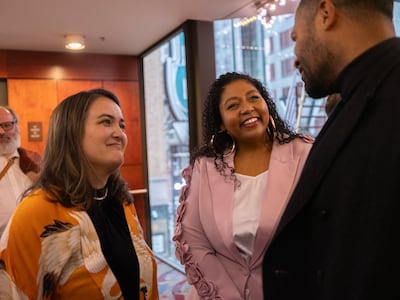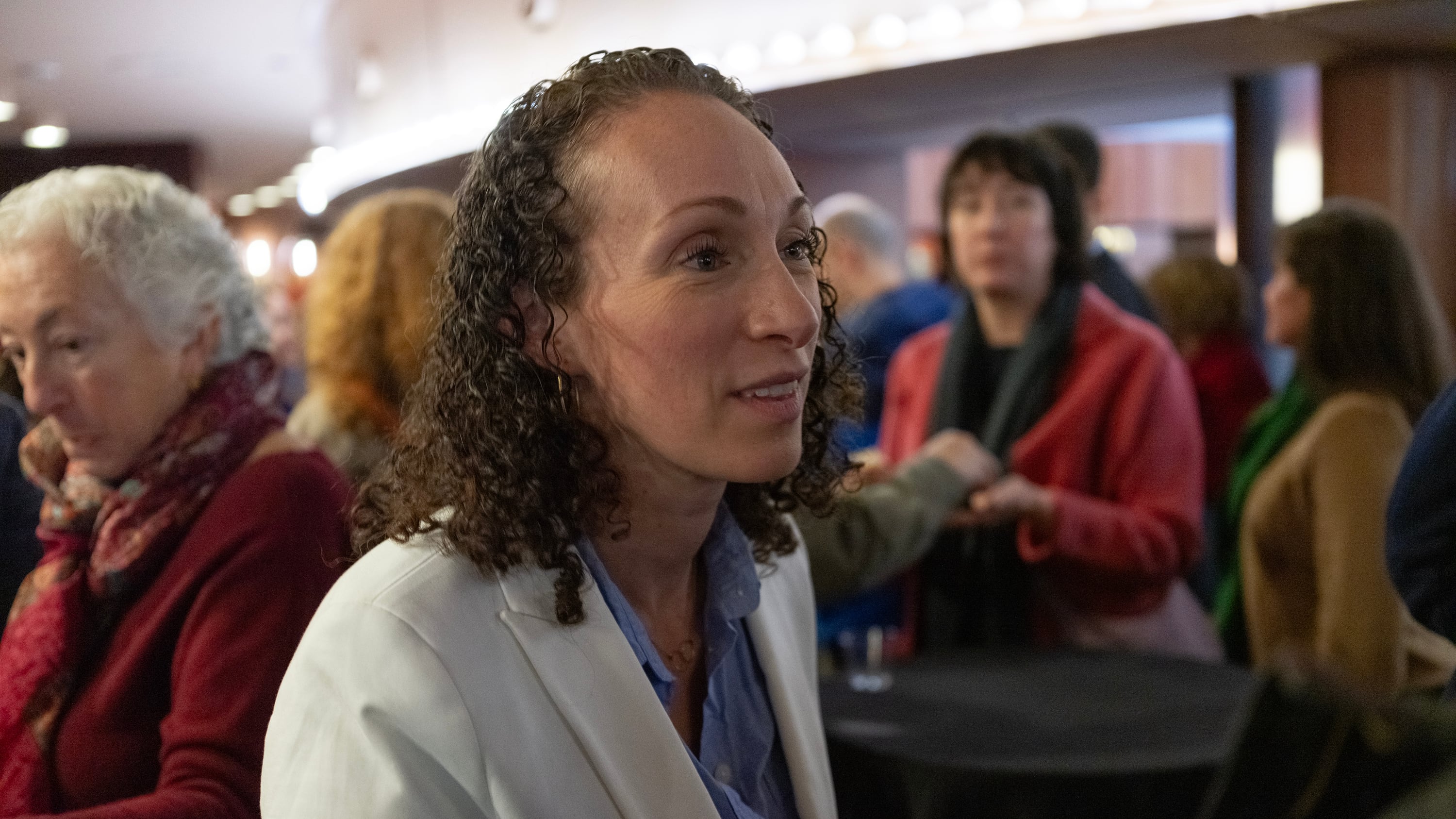Elana Pirtle-Guiney will serve as president of the freshly sworn-in 12-member Portland City Council. She was elected by a 7-5 vote this morning that saw the council initially deadlocked between Councilors Candace Avalos and Olivia Clark. The council conducted 10 rounds of voting before reaching resolution on Pirtle-Guiney.
Councilor Tiffany Koyama Lane was elected unanimously to serve as council vice president. That position largely plays a support role to the president.
The president’s position is a desirable one: The new council is a policymaking body rather than a managerial one, and the president has a critical role in setting the agenda, and as it currently stands has some powers to decide which policy items are heard by the council.
Pirtle-Guiney, one of the three councilors elected in District 2, was seen as the compromise choice between Avalos, a District 1 (eastside) councilor who is one of the more progressive members, and Olivia Clark, a District 4 (westside) councilor who for decades worked in state government and is a favorite of the business community.
Pirtle-Guiney spent a decade working at Oregon AFL-CIO, serving as its legislative and communications director. She then spent six years working for Gov. Kate Brown, first as a policy adviser and then legislative director. She’s also worked on various statewide campaigns, and most recently worked as a political consultant. On the campaign trail, Pirtle-Guiney came across as levelheaded and deliberate—perhaps a reflection of her decades in politics.
The first round of voting resulted in a 6-6 tie vote between Avalos and Clark, as did the second round. Some councilors opted to make short remarks before particular voting rounds, some imploring their colleagues to switch their vote to the candidate of their choosing when rounds began to drag on.
In the third round, Councilor Loretta Smith nominated Pirtle-Guiney. Pirtle-Guiney asked for a recess, which was approved. During the short break, councilors left the chambers to have individual conversations. On a bench just outside chambers, Councilor Steve Novick sat closely with Councilor Dan Ryan, discussing quietly. Avalos and Pirtle-Guiney spoke for a few minutes in the hallway before Pirtle-Guiney stepped into a room with her staffer, looking anxious, and Avalos’ staffer pulled her into a room with Councilor Jamie Dunphy. Similar one-on-one conversations, all brief and quiet, happened over the following 10 minutes, in hallways and in council offices.
In the third round, no majority was reached. Six councilors vote for Avalos, four voted for Clark, and two voted for Pirtle-Guiney. In the fourth round, Avalos received six votes, Pirtle-Guiney received five, and Clark received one.

A second recess was taken, and once again councilors fled into the hallway and into offices in small clusters to discuss. Councilors Sameer Kanal, Mitch Green and Angelita Morillo ran into an office. Avalos spoke behind the glass doors with Ryan in the District 1 offices. Right before the recess ended, Avalos came out of her talk with Ryan, and motioned hurriedly to pull Kanal, Morillo, Green and Tiffany Koyama Lane into a tight circle to talk briefly. Councilor Eric Zimmerman snacked on a bag of Doritos, and Clark walked assertively across the hallway.
When they reconvened, Pirtle-Guiney and Avalos tied with six votes apiece in the fifth, sixth, seventh, eighth and ninth rounds of voting.
During a third, 15-minute recess, councilors wasted no time in filing into various closed-door offices to speak in private. Zimmerman found a microwave to heat up lasagna.
Finally, in the 10th round, one councilor switched his vote to Pirtle-Guiney: Green of District 4, who ran on policy ideas largely in line with the Democratic Socialists of America.
In the final vote, the following councilors voted for Avalos: Avalos, Dunphy, Kanal, Koyama Lane and Morillo. The following councilors voted for Pirtle-Guiney: Loretta Smith, Pirtle-Guiney, Ryan, Novick, Clark, Green and Zimmerman.
The body’s first public meeting lasted over four hours, prolonged by early technological glitches. The two floors of observational seating were at capacity, filled with Zenith oil terminal protesters, city staff, union presidents and even one state representative.
Before a second round of president voting took place, Councilor Loretta Smith asked City Attorney Robert Taylor if Mayor Keith Wilson had the authority to break the tie. When Taylor said that the council president is elected only by the council itself, Smith disagreed, arguing that she interprets the city charter to give the mayor tie-breaking power in every council vote. Smith made a motion to give the mayor the tie-breaking vote, but her motion was handily quashed by a 9-3 vote, with only Councilors Smith, Ryan and Clark voting yes. Avalos called Smith’s objection “totally inappropriate” and against “the spirit” of the charter reform measure. Councilor Angelita Morillo said she felt “a little bit ambushed” by Smith’s last-minute motion.
Prior to Pirtle-Guiney’s election, the City Council heard a first reading of an ordinance that defines and clarifies some of the powers of the president. As WW reported earlier this week, two camps emerged in informal council meetings about the role of the president, and just how much authority that role should have. But the ordinance heard by councilors on Thursday morning represented some changes that were agreed upon by all councilors.
Councilor Sameer Kanal last week had submitted—with the permission of his colleagues—an ordinance that outlined a number of changes to the president’s powers that he said were a compromise between all of them.
“It’s not how any one of us would have written it,” Kanal said of the ordinance from the dais, “but it represents a compromise.” The changes would include allowing any councilor to send an idea to a committee for discussion, and a group of four councilors to send an item to the full council if it does not make its way out of committee.
More contentious powers—like whether the president should have the authority to appoint committee members and chairs—will also be discussed and voted on in subsequent meetings this month.
Kanal leads a group of councilors who urged their colleagues to water down the powers of the president, saying that having one councilor with outsized authority over the council’s agenda and committees would undermine the intent of the 2022 charter reform that created Portland’s new form of government.
Eric Zimmerman, a District 4 councilor, is leading a group of councilors who want a stronger president. Zimmerman has voiced concern that without a leader, the council won’t be taken seriously either by the administrative side of the government or by voters.

